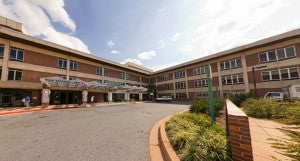A couple weeks back I got connected with Cheryl Nordyke, a Senior Account Manager at Forrester Research and a social media guru (check out her Facebook page, Waves of Gratitude). She came to my office and the first thing she said to me was, "Brandon, you're a disruptor." I didn't know what she meant at the time, but she explained further, "You're the guy that's never afraid to go after what's missing; the what else in any situation." That sounded like a good way to summarize what I've always been about, so I decided to look back at my earliest days of disrupting once I started my post-college career.
--
- The Greater Baltimore Medical Center, where I started my career after college.
I’ve always been a disruptor- always looking for the What Else, the details, in every situation.
When I say always, I mean always. From my time delivering newspapers as a 10-year-old, to when I got out of college and sent all of my resumes with notes in red marker, being a disruptor has always been in my blood.
Coming out of college it took me a few months to find a job, but I finally began work at the Greater Baltimore Medical Center. I was put in charge of the cost accounting for the employee cafeteria and the coffee shop.
After less than a week, I realized that place was sideways. When there’s nurses, doctors and hospital other employees eating from the cafeteria twice a day, they HAVE to like the food. And they didn’t. For the most part, they hated it. In a hospital, meeting someone’s dietary needs is essential and I knew something had to change. On top of that, the nurses and doctors were upset with the communication and lack of responses to special patient needs.
My first month went by and the CEO from a dietary consulting that ran our, and many other, hospital dietary departments came to check-in on how thing were going with cleanliness, quality control, etc.
He asked me, “How are you doing? How’s your first month on the job?”
“Horrible,” I said, “This is a sham!” He looked at me like I was crazy! He was shocked to get the straight truth and was a little taken aback.
But I explained, “We’re not good with the employees, the nurses or the doctors. They’re the most important people in all of this.” Suffice it to say, my boss was pretty impressed that a 22-year-old kid right out of school had the balls to speak up and admit that things needed to change. He recognized that I had the awareness to understand where we could improve, even at my age, and that’s when he started asking me for my opinion about what we should do to fix our problems.
And here’s what I did:
“Show our employees that we care.”
I started going out to play basketball with my co-workers from the washroom, dish room and all areas of the kitchen. I would ask them if there was anything we could do to make their lives any easier. Was any equipment not working? Etc.
I asked every nurse and every doctor on every floor of the hospital, “How are we doing? What can we do better?”
In reality, complaints were minimal, but everyone LOVED the fact that I still went up to them and asked. Sometimes the best way to improve is just ask the people that you’re supposed to be servicing. I took it upon myself to do this and because of that I got answers and feedback. Then, I really went to work.
I told my boss that one of the things I would do was put together some special events in the cafeteria. Italian Day, Irish Day, etc. It was simple stuff- remember, I had a food background as a cook, but now I was into management- and everyone loved it!
So, I had taken a chance and it worked out. I confronted the guy that ran the big dietary consulting company instead of just telling him what he wanted to hear. I told him the truth and I told him what I was going to do about it to fix the problems.
When I left that hospital about a year later there was a petition to get me back that the nurses and doctors had. I don’t know how many employees in a pretty big hospital get a petition in a written up to not let me go, but that’s what being a disruptor is all about. Because I took action and went with my gut, that’s what eventually got me my dream job at the time working for Hyatt.
I interviewed for that job-the last one open- running the employee cafeteria, of course. When I told the story from the hospital and how I involved the doctors and nurses and improved employee morale, I was hired on the spot! I believe I would not have gotten that job under normal circumstances, but because I went all-in and created that disruption in the hospital cafeteria, those dividends paid off. I got an unbelievable boost to my career from working at Hyatt.
You never know, I may not have acquired the experience necessary for the job at Hyatt had I not pushed to be a disruptor at the hospital.

- The Hyatt Hotel in Baltimore, MD, where I got my dream job following my stint working at the Greater Baltimore Medical Center


